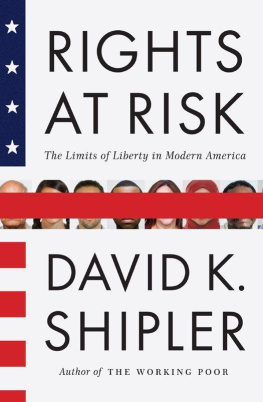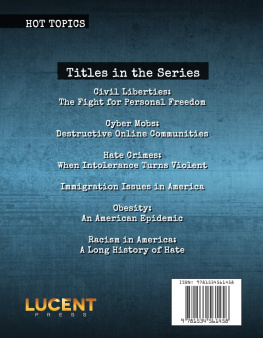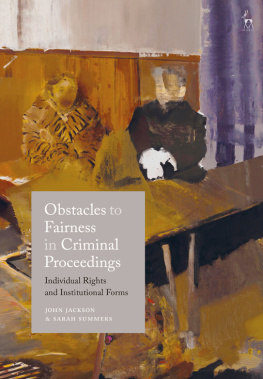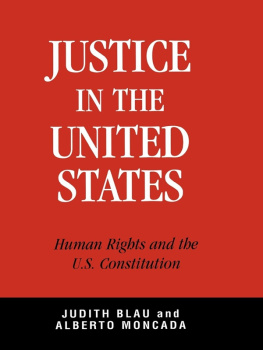ALSO BY DAVID K. SHIPLER
The Rights of the People:
How Our Search for Safety Invades Our Liberties
The Working Poor: Invisible in America
A Country of Strangers: Blacks and Whites in America
Arab and Jew: Wounded Spirits in a Promised Land
Russia: Broken Idols, Solemn Dreams
THIS IS A BORZOI BOOK
PUBLISHED BY ALFRED A. KNOPF
Copyright 2012 by David K. Shipler
All rights reserved. Published in the United States by Alfred A. Knopf, a division of Random House, Inc., New York, and in Canada by Random House of Canada Limited, Toronto.
www.aaknopf.com
Knopf, Borzoi Books, and the colophon
are registered trademarks of Random House, Inc.
Grateful acknowledgment is made to the following for permission to reprint previously published material: John E. Reid & Associates. Excerpts from various online Investigator Tips at http://www.reid.com/ .
Reprinted by permission of John E. Reid & Associates.
Vladimir Bukovsky. Excerpts from Tortures Long Shadow, Washington Post, Outlook, Dec. 18, 2005. Reprinted by permission of Vladimir Bukovsky.
Library of Congress Cataloging-in-Publication Data
Shipler, David K., date.
Rights at risk : the limits of liberty in modern America / David K. Shipler.
p. cm.
Includes bibliographical references.
eISBN: 978-0-307-95762-7
1. Civil rightsUnited StatesHistory. 2. LibertyUnited States. I. Title.
KF4749.S525 2012
342.73085dc23 2011034754
Front-of-jacket images (left to right): Radius Images / Alamy; Plattform / Getty Images; itanistock / Alamy; Jay B. Sauceda; Purestock and Tom Le Goff (all Getty Images); moodboard / Alamy; Radius Images / Getty Images. Spine-of-jacket images: Exotica / SuperStock; Yuri Arcurs / Alamy
Jacket design by Jason Booher
v3.1_r2
For Madison, Ethan, Benjamin, Kalpana, Dylan,
and those of their generation yet to come
In a free society, some are guilty, but all are responsible.
Abraham Joshua Heschel
CONTENTS
THE BILL OF RIGHTS
FIRST AMENDMENT
Congress shall make no law respecting an establishment of religion, or prohibiting the free exercise thereof; or abridging the freedom of speech, or of the press; or the right of the people peaceably to assemble, and to petition the Government for a redress of grievances.
SECOND AMENDMENT
A well regulated Militia, being necessary to the security of a free State, the right of the people to keep and bear Arms, shall not be infringed.
THIRD AMENDMENT
No Soldier shall, in time of peace be quartered in any house, without the consent of the Owner, nor in time of war, but in a manner to be prescribed by law.
FOURTH AMENDMENT
The right of the people to be secure in their persons, houses, papers, and effects, against unreasonable searches and seizures, shall not be violated, and no Warrants shall issue, but upon probable cause, supported by Oath or affirmation, and particularly describing the place to be searched, and the persons or things to be seized.
FIFTH AMENDMENT
No person shall be held to answer for a capital, or otherwise infamous crime, unless on a presentment or indictment of a Grand Jury, except in cases arising in the land or naval forces, or in the Militia, when in actual service in time of War or public danger; nor shall any person be subject for the same offence to be twice put in jeopardy of life or limb; nor shall be compelled in any criminal case to be a witness against himself, nor be deprived of life, liberty, or property, without due process of law; nor shall private property be taken for public use, without just compensation.
SIXTH AMENDMENT
In all criminal prosecutions, the accused shall enjoy the right to a speedy and public trial, by an impartial jury of the State and district wherein the crime shall have been committed, which district shall have been previously ascertained by law, and to be informed of the nature and cause of the accusation; to be confronted with the witnesses against him; to have compulsory process for obtaining witnesses in his favor, and to have the Assistance of Counsel for his defence.
SEVENTH AMENDMENT
In Suits at common law, where the value in controversy shall exceed twenty dollars, the right of trial by jury shall be preserved, and no fact tried by a jury, shall be otherwise re-examined in any Court of the United States, than according to the rules of the common law.
EIGHTH AMENDMENT
Excessive bail shall not be required, nor excessive fines imposed, nor cruel and unusual punishments inflicted.
NINTH AMENDMENT
The enumeration in the Constitution, of certain rights, shall not be construed to deny or disparage others retained by the people.
TENTH AMENDMENT
The powers not delegated to the United States by the Constitution, nor prohibited by it to the States, are reserved to the States respectively, or to the people.
PREFACE
The people in these pages stand where the Bill of Rights meets everyday America, from the courtroom to the classroom. They benefit when the Constitution is upheld and suffer when it is evaded. Most of their names will not be familiar, because these citizens and aspiring citizens are typically violated invisibly, well below the radar of public attention. For many of them, losing their rights may be tragically momentous, but few of their cases are landmarks. They shape the constitutional culture imperceptibly, accumulating only gradually into trends and patterns. My task here is to throw light on those shifting patterns of liberty.
This book may lead readers to their own verdicts on the guilt or innocence not only of criminal defendants but also of those who interrogate and prosecute them, and even represent them. Wherever a persons freedom is balanced on a fine edge, the state itself may be culpable or virtuous. In the ranks of the guilty and the innocent there stand not only immigrants but also officials who deport them, not only political protesters but also police who arrest them, not only dissenting schoolchildren but also principals who suspend them for their speech.
I have tried here to portray the law in human terms and to see the human stories in the context of the law. I am not an attorney, so I owe much to the generosity of defense lawyers, prosecutors, and judges who taught me what they could about the Constitution, the courts, and the law. They answered myriad questions, provided volumes of documents, and made themselves available for multiple consultations. Those who deserve thanks beyond what I could offer in the text are named here.
David Tatel, a friend and federal appeals court judge, put me in touch with well-informed judges and lawyers, educated me on the law and the Constitution, and made helpful suggestions on drafts of chapters. A. J. Kramer, the federal public defender in Washington, D.C., gave me an office and weeks of access to his team of skilled attorneys, who discussed cases, took me to hearings and trials, and helped me see firsthand the elements of the Bill of Rights most seriously at risk. Kramer provided feedback and fact-checking on parts of the manuscript.
The assistant public defenders Tony Axam, David Bos, Beverly Dyer, Neil Jaffee, Jonathan Jeffress, Tony Miles, Shawn Moore, Michelle Peterson, Mary Petras, Lara Quint, Gregory Spencer, Robert Tucker, and Carlos Vanegas were immensely generous in guiding me through the complexities of criminal law. Other helpful defense attorneys included Whitney Boise, James Brosnahan, Frank Dunham, Richard Foxall, Steve Kalar, Larry Kupers, Bob Luskin, Jerome Matthews, James McCollum, Andrew Patel, Gregory L. Poe, Barry Portman, Jay Rorty, Elden Rosenthal, Bryan Stevenson, Marc Sussman, and Kristen Winemiller. William B. Wiegand, an assistant U.S. attorney, expertly answered legal questions about asset forfeiture and other issues, making me the beneficiary of his precise thinking and extensive knowledge. Most prosecutors and some judges preferred anonymity, so my gratitude to them has to remain private.
Next page






